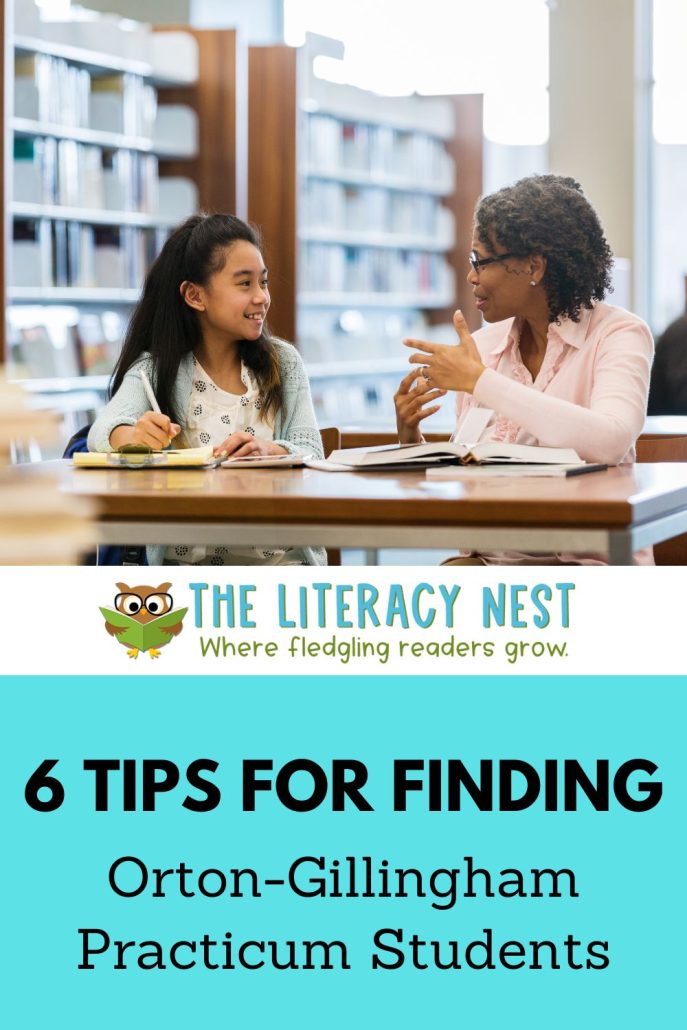6 Tips for Finding Orton-Gillingham Practicum Students
Finding Orton-Gillingham practicum students may seem intimidating, but it can be quite easy if you’re networking in the right places!

What is an Orton-Gillingham Practicum?
The O-G practicum is similar in many ways to student teaching. It is a way of putting theory into practice with the support and feedback of a mentor. A practicum is very similar to regular tutoring or lessons, but generally will include observations, turning in lesson records for feedback, and consultation with a mentor about decisions about their tutoring. A practicum gives a teacher learning O-G an opportunity to analyze their lessons and put the Orton Gillingham principles into practice. For many being prescriptive and diagnostic is a new type of teaching.
Learn more about the Benefits of An Orton Gillingham Teacher Training Practicum!
Why is an Orton-Gillingham practicum valuable for trainees?
The practicum is essentially a gradual release of responsibility model of learning. The trainee can get the amount of support and scaffolding they need to successfully implement the OG methods. The requirements ensure frequent and ongoing feedback to help trainees refine and improve their practice. Most training programs require 2 different practicum students which has the advantage of exposing the trainee to different students with different learning profiles. One of the principles of O-G is individualization. A practicum ensures trainees can respond appropriately in order to teach contingently.

Six Ways of Finding Orton- Gillingham Practicum Students
Download and print our tip sheet for finding Orton-Gillingham practicum students!
1. Word of mouth
Talking to friends and family and letting them know you are looking for a student for your practicum can be surprisingly effective. Word of mouth is also one of the most powerful ways to find new students for your tutoring business. Dyslexia is common enough that chances are good that someone you know has a connection that needs O-G tutoring.
2. Ask in local parent groups on Facebook.
Introduce yourself and share your background and credentials. Explain the parameters of the practicum and include your contact information.
3. Speak with local schools, both public and private.
Reaching out to local schools will make administrators and teachers aware of this opportunity for their students. Private schools may not have the staff on hand to meet a particular child’s needs and may wish to partner with you to meet their students’ needs.
4. Check with your local Decoding Dyslexia group and IDA branch.
These are organizations that parents seeking tutoring services are likely to reach out to. Being proactive may attract interested parties.
5. Check with local Homeschooling groups.
Another source of potential practicum students is from the homeschooling community. These students are unlikely to be receiving any sort of special education services and may really wish to pounce on an opportunity like an O-G practicum. Another great aspect of working with homeschoolers Is that they are available when public school kids are not.
6. Check with local professionals who conduct academic testing.
As a tutor, I am often asked for recommendations about professionals who do testing. Psychological examiners in turn are often asked for recommendations for tutors.
Tips for pitching the idea:
If you encounter a reluctant prospect, the right sales pitch can make all the difference. Having information to answer their potential questions right away is important.
For example:
- Explain how this will benefit their child.
- Share your background and contact information.
- Explain the parameters of the practicum, including location and duration. Share what will happen during this period. Be sure to be upfront about your being supervised and that lessons may be recorded.
- Seek permissions.
- Be sure to include any special considerations such as information about makeups and cancellations.
- If you are charging the practicum student, you may wish to consider a reduced rate to sweeten the deal.
Are you looking for professional development that will help you better support your students with dyslexia? The Literacy Nest has a membership for that…
Building Readers for Life Academy is a monthly membership program that empowers educators AND families. It dives into structured literacy and strategies for ALL learners. With BRFL Academy, you’ll learn what it takes to help EVERY student become a reader for life.
Join Building Readers for Life Academy today and pay just $1 for your first 30 days! Click here.




